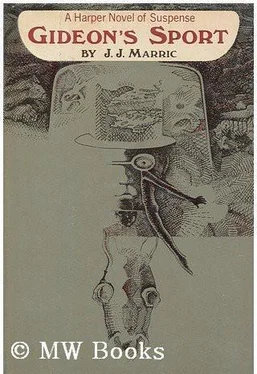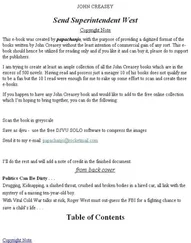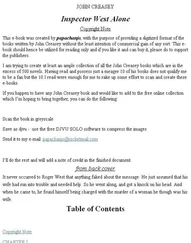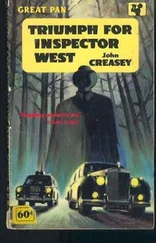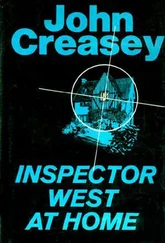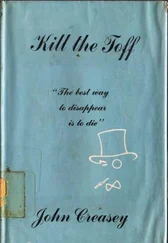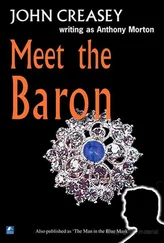John Creasey - Gideon’s Sport
Здесь есть возможность читать онлайн «John Creasey - Gideon’s Sport» весь текст электронной книги совершенно бесплатно (целиком полную версию без сокращений). В некоторых случаях можно слушать аудио, скачать через торрент в формате fb2 и присутствует краткое содержание. Жанр: Старинная литература, на русском языке. Описание произведения, (предисловие) а так же отзывы посетителей доступны на портале библиотеки ЛибКат.
- Название:Gideon’s Sport
- Автор:
- Жанр:
- Год:неизвестен
- ISBN:нет данных
- Рейтинг книги:4 / 5. Голосов: 1
-
Избранное:Добавить в избранное
- Отзывы:
-
Ваша оценка:
- 80
- 1
- 2
- 3
- 4
- 5
Gideon’s Sport: краткое содержание, описание и аннотация
Предлагаем к чтению аннотацию, описание, краткое содержание или предисловие (зависит от того, что написал сам автор книги «Gideon’s Sport»). Если вы не нашли необходимую информацию о книге — напишите в комментариях, мы постараемся отыскать её.
Gideon’s Sport — читать онлайн бесплатно полную книгу (весь текст) целиком
Ниже представлен текст книги, разбитый по страницам. Система сохранения места последней прочитанной страницы, позволяет с удобством читать онлайн бесплатно книгу «Gideon’s Sport», без необходимости каждый раз заново искать на чём Вы остановились. Поставьте закладку, и сможете в любой момент перейти на страницу, на которой закончили чтение.
Интервал:
Закладка:
The first thing he felt was the sharp pain in that shoulder and in his shin.
The second was near-panic, because of the shoulder. He was deaf to the shouting, the shrilling of whistles, the pounding of feet. He was simply filled with blind panic at the unbearable shattering of his dream. Because he could not use that shoulder again for days: the precious, vital days.
CHAPTER EIGHTEEN
Despair
Police Constable Donaldson was in that particular car park because he suspected that the pick-pockets and bag-snatchers used two or three cars in the park, near the direct entrance from the courts, to stow away their loot. He was still in a flush of satisfaction because Superintendent French had told him that his report was being taken seriously and he was to see Chief Inspector Bligh later in the day. Meanwhile, French had pointed out, if he could find more evidence against Martha Triggett, then the stronger his case and the better his chances of transfer to the Criminal Investigation Department.
Donaldson’s attention had first been aroused by the frequency of the visits to that particular car park during playing-hours. People came in late, often enough; but few, once they were at Wimbledon, left early. While keeping watch, he had noticed three different youths and two girls go up to one of three cars, open the boot, put something in, close and lock it, and return to the courts area. There were always hundreds of people moving about, going from one court to another -drawn by rumours of a close match or of a personality, or of trouble — so the pathways were always thronged.
What they do, Donaldson reasoned, is go and take a wallet or what-have-you and unload it into the car. Then, I’ll bet, someone comes and takes the stuff away.
He had been there at that particular time, standing behind a. big, old-fashioned Rolls-Royce which gave him fair cover, to watch the three cars he believed were being used as a temporary cache. He had seen the four men come into the park and although he had recognised none of them, there was something in their manner which had made him suspicious. The way they looked around, for instance; the way they gathered in a kind of cordon, and waited — for what? His first suspicion was that they were car thieves, here on a lightning raid: but there was nothing hurried about what they were doing.
Then he had seen a tall negro coming across the park, and had noticed the way the waiting men tensed. The young negro had made his way to a motor-scooter and the policeman had looked from him to the four men. He did not fully understand; did not realise what was going to happen — until three of them began to approach the negro menacingly. And in the instant that one man struck with savage force, P.C. Donaldson blew his whistle.
Within seconds, other police were hurrying to the scene as the four attackers fled. Once they reached the crowded pathways, there was little chance to catch them, and all four got away.
But Chief Inspector Bligh, who had heard the alarm, had caught sight of one of the fleeing men. And he had no doubt at all that it was Sebastian Jacobus, the well-known Right-wing troublemaker and a ring-leader in the agitation against immigrants living in Britain.
Gideon’s lunch, with two prominent bankers who wanted to discuss general security for bank transport, was useful, but there was little he could promise. He would have to ponder deeply, as well as contact the City of London police and other forces in the Home Counties. As he left the City restaurant, close to the stark, new Barbican and mellowed St. Paul’s, he saw a coloured bus conductress, and his thoughts flew to Juanita Conception. The lunch hadn’t lasted too long, and he could just fit in a visit.
His driver ventured: “I had a bet with myself that you’d go to the hospital, sir.”
Gideon grunted.
Ten minutes later, he went into a small ward, where the girl was dozing. He half-wished he had not bothered her, for she was so obviously under sedation that the name ‘Gideon’ did not seem to mean anything to her. He murmured a few platitudes, and left, carrying a picture of her young face and the huge pad on her lips.
Once back at his office, he felt glad that he had been to the hospital. Such visits were never a waste of time. He had begun to look through some papers when Bligh telephoned.
The note of excitement in his voice was very noticeable as he reported.
“Quite sure it was Jacobus you saw?” asked Gideon.
“Positive, sir,” said Bligh.
“And they attacked this American just after he’d come off the court?”
“About half-an-hour afterwards, sir. And there’d been an incident when he was on the court, during his match. Just as he was at match point, a man in the crowd shouted out ‘Go home, nigger! I — er — happened to be there.”
“What happened?” demanded Gideon.
“Well, a rather fine thing, sir,” Bligh told him. “He was playing young Bruce Hamilton, one of Australia’s most promising young players. Hamilton obviously heard the baiting, and threw away two points. He was outclassed, mind you -this chap Rudge is a very powerful player. But his nerve was badly shaken and Hamilton might have turned the tables -very sporting gesture, it was. Afterwards — it’s a bloody shame — young Rudge fell and hurt his shoulder. It’s probably going to make him drop out and it wouldn’t have surprised me if he’d beaten some of the top seeds.”
“Pity,” Gideon grunted. “Bad enough if he’d just had an accident.” He was sifting through some papers on his desk and couldn’t find what he wanted. “Hold on, Bligh.” He pressed a bell for Hobbs, who came in at once. “Alec, I read something about Sebastian Jacobus today, he met a — ah! I’ve remembered. Wait a minute, Alec, will you?’’ He spoke into the telephone again: “Jacobus has cropped up in another job -we’ll find him and talk to him, but you concentrate on Wimbledon. How are things going on the pick-pocket front?”
“Not much doubt about what’s happening, sir-and Donaldson’s right,” Bligh answered. “It’s a very well-organised business. If I could come and report in the morning —”
“All right,” Gideon told him. “Ten-thirty.” He rang off and looked up at Hobbs, half-smiling. “How did Bligh do at the meeting?” he asked. A
“He was brilliant,” Hobbs said simply.
“H’mm. Watch him — we don’t want this to go to his head. He’ll be here at half-past ten tomorrow.” Gideon sifted through his notes: “Here’s what I want — Jacobus and John Spratt were seen in a huddle at the R.A.A. Club, this morning — no, yesterday.” He frowned. “And Charlie Blake died after telling Lem there was something being rigged over the Derby. And Lem certainly thinks Jackie Spratt’s are involved. What about those two Americans — Colonel-something-Hood and Thomas Moffatt?”
“We’ve had no report,” Hobbs replied. “They’re at the Chase Hotel but presumably behaving quite normally.”
“They are being watched, I take it?”
“Yes.”
“Get an up-to-the-minute report quickly, will you?” Gideon said.
“Tonight?” asked Hobbs.
Gideon pursed his lips, then shook his head.
“Shouldn’t think we need it that fast. If anything urgent should crop up, we’ll be told. The morning should do.”
It was not like Hobbs to agree to put anything off and Gideon wondered what he had planned for the night. Then he realised that he hadn’t told Hobbs about the doctor’s report on Kate. So he told him in the simplest of terms.
Hobbs showed deep relief, touched with anxiety.
“Why don’t you take her down to Brighton yourself?” he asked. “We can manage here, and — “
“I don’t doubt that you can manage,” said Gideon drily. “But it’s not an emergency, thank God. I want to see what happens at Lords tomorrow. I —” He broke off, staring hard, almost as if he had been seized by a sudden pain. “If they are going to cause trouble at the match, it will be tomorrow, won’t it?”
Читать дальшеИнтервал:
Закладка:
Похожие книги на «Gideon’s Sport»
Представляем Вашему вниманию похожие книги на «Gideon’s Sport» списком для выбора. Мы отобрали схожую по названию и смыслу литературу в надежде предоставить читателям больше вариантов отыскать новые, интересные, ещё непрочитанные произведения.
Обсуждение, отзывы о книге «Gideon’s Sport» и просто собственные мнения читателей. Оставьте ваши комментарии, напишите, что Вы думаете о произведении, его смысле или главных героях. Укажите что конкретно понравилось, а что нет, и почему Вы так считаете.
